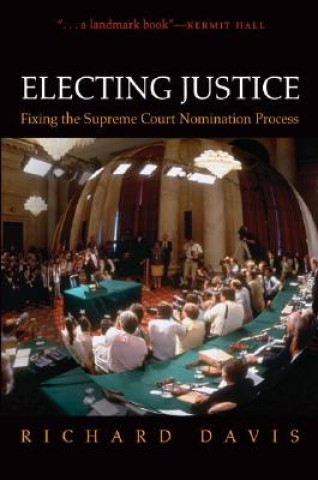
Doručenie
Nákupný poradca





Nehodí sa? Žiadny problém! U nás môžete do 30 dní vrátiť
 Darčekový poukaz
v ľubovoľnej hodnote
Darčekový poukaz
v ľubovoľnej hodnote
S darčekovým poukazom nešliapnete vedľa. Obdarovaný si za darčekový poukaz môže vybrať čokoľvek z našej ponuky.
Electing Justice
 Angličtina
Angličtina
 230 b
230 b
30 dní na vrátenie tovaru
Mohlo by vás tiež zaujímať


The nomination and confirmation of Supreme Court justices has, in recent years, become a battleground like no other. Bruising Senate confirmation hearings for failed nominee Robert Bork and successful nominee Clarence Thomas left the reputation of all branches of government in disarray and the participants--and the nation--exhausted. The Senate's Constitutional prerogative to provide advice and consent to the President's nominations to the highest court in the land has given rise to political grandstanding and ideological battles. Less well known is how other players--interest groups, the news media, and, through their involvement, the general public--also affect the conduct and outcome of the Supreme Court nomination process. Electing Justice reveals how from the late 1960s on, the role of these other players grew in intensity to the point that the nomination process would be unrecognizable to its original devisers, the Framers of the Constitution. Over the past quarter century, live television coverage of Senate hearings, "murder boards" in preparation for those hearings, a flood of press releases, television and radio advertisements, and public opinion polls all characterize nominations. Unlike earlier, more elite-governed processes, the involvement of outside groups has become highly public and their effect on the outcome of some nominations is now widely accepted. How should we respond to this informal democratization of the selection process? The genie, Davis contends, cannot be put back into the bottle and we cannot return to a non-political, elite-driven ideal. Davis concludes with several controversial recommendations that preserve the public role while avoiding the excesses of past controversial nominations. By embracing the public's new role in the examination of nominees we can ensure a democratic process and secure an independent and accountable judicial branch.
Informácie o knihe
 Angličtina
Angličtina




 Ako nakupovať
Ako nakupovať





























